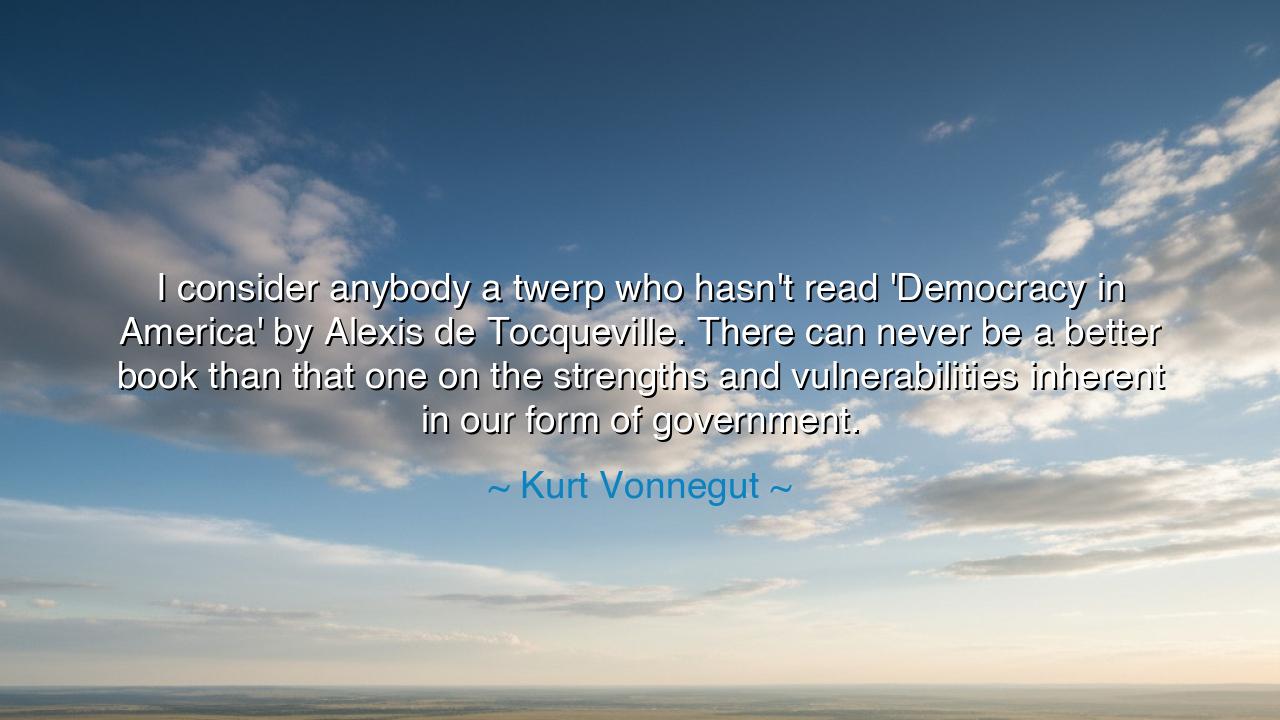
I consider anybody a twerp who hasn't read 'Democracy in America'
I consider anybody a twerp who hasn't read 'Democracy in America' by Alexis de Tocqueville. There can never be a better book than that one on the strengths and vulnerabilities inherent in our form of government.






When Kurt Vonnegut declared, “I consider anybody a twerp who hasn’t read ‘Democracy in America’ by Alexis de Tocqueville. There can never be a better book than that one on the strengths and vulnerabilities inherent in our form of government,” he spoke not as a scholar of politics, but as a prophet of civic wisdom. His words, though sharp with humor, were also heavy with reverence. For Vonnegut — a writer who spent his life exposing the absurdities of power, war, and modern civilization — this was not mere literary praise. It was a call to remembrance: that the health of a democracy depends on the self-awareness of its citizens. In urging others to read Tocqueville, he was urging them to look into the mirror of their own nation and confront both its light and its shadow.
The origin of this quote rests in Vonnegut’s lifelong fascination with the American experiment — a republic built upon ideals yet haunted by contradictions. Having lived through the Great Depression, World War II, and the turbulent decades that followed, Vonnegut saw the triumphs and failings of democracy firsthand. His admiration for Tocqueville’s Democracy in America came from recognizing in it a timeless wisdom — a book written in the 1830s by a Frenchman who traveled through a young America and saw what few Americans themselves could see: the balance between liberty and equality, the vitality of community life, and the lurking danger of complacency. Tocqueville’s insight was not confined to his century; it was a prophecy for all who would inherit democracy’s fragile promise.
Tocqueville’s masterpiece, the work Vonnegut so fiercely revered, was more than a political analysis — it was a moral diagnosis of freedom itself. He saw in America both the strength of self-governance and the vulnerability of human nature. He warned that democracy, if not guarded by virtue and vigilance, could slide into what he called “soft despotism” — a condition where citizens, distracted by comfort and pleasure, surrender their freedom bit by bit until they live as slaves without chains. To read Democracy in America, therefore, is to awaken to the paradox of liberty: that the same equality which empowers the many can, if corrupted, smother the soul of the individual. This is what Vonnegut meant by “the strengths and vulnerabilities inherent in our form of government.” He recognized that the battle for freedom is fought not on battlefields, but in the conscience of every citizen.
Vonnegut himself had witnessed this battle. As a soldier captured during World War II, he saw how obedience to authority could turn ordinary men into instruments of cruelty. Later, as an author, he watched his country wrestle with Vietnam, Watergate, and corporate greed, and he saw how democracy could decay not through conquest, but through corruption and apathy. In those years, his humor turned bitter and his satire sharpened. Yet through it all, he held to Tocqueville’s insight — that democracy’s greatest danger lies not in tyranny imposed from above, but in moral decay from within. When Vonnegut mocked those who had not read Tocqueville, he was mocking not ignorance, but indifference — the deadliest sin of the free.
Indeed, Tocqueville’s warning and Vonnegut’s echo still ring true today. For in every age, societies are tempted by the false comfort of submission: to trade responsibility for convenience, courage for conformity, participation for passivity. The people grow weary of thinking, and the state grows eager to think for them. This was the danger Tocqueville foresaw, and it was the same disease Vonnegut diagnosed in modern life — the quiet drift toward a world where the machinery of government, technology, and mass culture numbs the soul. To read Democracy in America is therefore not an act of scholarship, but an act of resistance. It is to remind oneself that freedom, like love or faith, must be renewed each day through action and understanding.
Consider the story of Benjamin Franklin, who, when asked what form of government the new nation had been given, replied: “A republic, if you can keep it.” That “if” hangs like a challenge through the centuries. Tocqueville’s book was a long meditation on that single word — and Vonnegut, in his brash and humorous way, was reminding his readers of it. He knew that democracy is not self-sustaining; it depends on citizens who think, who question, who read, and who remember. When people cease to understand their government, they cease to own it — and it ceases to serve them.
The lesson, then, is clear: knowledge is the lifeblood of liberty. To read, to reflect, to confront the truths of one’s own nation — these are the duties of the free. Vonnegut’s exhortation is not merely about a book, but about an attitude: the humility to learn and the courage to care. If Democracy in America is a mirror, then we must not look away from what it shows us — both the greatness and the frailty of our civic soul.
And so, let these words be remembered as both jest and judgment. To live in freedom without understanding it is to be unworthy of it. Read Tocqueville, Vonnegut commands — not because he was French, nor because he was right, but because he saw. He saw what freedom costs, what it demands, and what it loses when men grow complacent. For democracy is not a gift we inherit; it is a flame we must continually tend — lest it, like all neglected fires, turn to ash in the winds of time.






AAdministratorAdministrator
Welcome, honored guests. Please leave a comment, we will respond soon